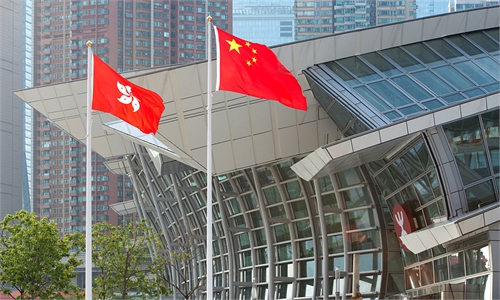HK companies eye mainland market amid global trade headwinds in the post-virus world
As consumer base expands, business becomes more lucrative

Aerial photo taken on July 16, 2020 shows the Victoria Harbour in Hong Kong, south China. (Xinhua/Lui Siu Wai)
Hong Kong-based companies are increasingly looking at the Chinese mainland market amid global trade headwinds in the post-virus world, as China's policy to make the domestic market a mainstay in the coming years.
Amid lackluster growth in demand in Western countries, the Hong Kong Special Administrative Region (HKSAR) government organized a dozen Hong Kong companies to attend the 12th China Processing Trade Products Fair in Dongguan, South China's Guangdong Province on Thursday.
With retail sales hitting a record high of 41.2 trillion yuan ($6.26 trillion) in 2019, the Chinese domestic market is expected to overtake the US consumer market, currently the world's largest, according to the National Development and Reform Commission, China's top economic planner.
The rising prominence of the Chinese domestic market has drawn attention from companies in the HKSAR, many of which are under pressure as Hong Kong's economy was badly hit by the pandemic.
"In the past, we were so focused on export orders from Western markets that we did not pay much attention to the mainland market," said McArthur Lü, a manager at Dongyu Clothing, a maker of swimsuits.
However, as the rise of e-commerce has largely put an end to the business model of placing large orders and given rise to more customized production and fragmented orders, the difference in profit margins between the domestic and overseas market is narrowing.
"A decade ago, we would receive a single order for 100,000 swimsuits. Nowadays, we make 200 different types of swimsuits to reach that figure," Lü said.
As consumption rises in the mainland, Dongyu Clothing is finding the domestic market to be nearly as lucrative as the Western market.
Lü's company will sell 30 million yuan worth of goods this year, and although the Western market still accounts for 80 percent of its business, Lu said the growing importance of the domestic market has become very apparent.
Felix Huang, a manager at toy model carmaker Maisto, said that the company's domestic business has been growing at a breakneck pace, expanding 50 percent annually in the past few years.
This is due to the Chinese mainland's vast population, rising income levels and consumption demand, and evolving taste toward higher-quality goods, Huang told the Global Times.
Even in 2020, amid the pandemic, Maisto's sales still grew 15 percent.
"Entering the domestic market is not easy, as China is the maker of toys for the world, but with Generation-Z consumers becoming the driving force of consumption, we really see an opportunity coming. They, unlike older consumers, value intellectual property (IP), quality and the educational functions of our toys," Huang said.
A domestic market of 1.4 billion consumers will offer huge space for growth for Hong Kong companies, Ren Hongbin, assistant minister of the Ministry of Commerce, said at a forum at the trade fair.
Huang said the mainland market, which accounts for 30 percent of the company's sales, has surpassed the North American market, which takes a 25-percent share.
Jack Lee, a sales manager with Morning Light Intelligent Printing Group, which prints patterns during the process of plastic injection, said that as an original equipment manufacturer, one of the biggest issues in expanding into the mainland market is a lack of recognized brands and successful marketing.
Different standards in the Western and Chinese markets, securing franchises from IP owners, and getting accustomed to different payment methods are some of the issues faced by Hong Kong companies that want to turn to the mainland market for growth, experts said at the forum.
But they pointed out that Hong Kong companies could seize the trend in which China is moving to accelerate the establishment of a new development pattern featuring "dual circulation" that takes the domestic market as the mainstay and allows the domestic and foreign markets to boost one another, and the development and integration of the Guangdong-Hong Kong-Macao Greater Bay Area.
The city of Dongguan has been working to facilitate the sales of export-oriented goods into the domestic market since 2017, and, sales in this category reached 442.51 billion yuan last year, with year-on-year growth of 10.1 percent, according to public data.




